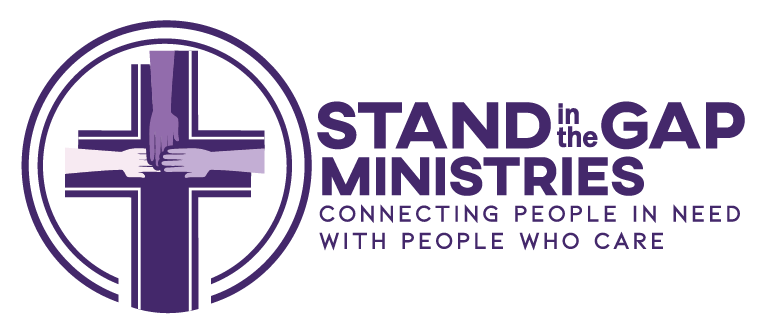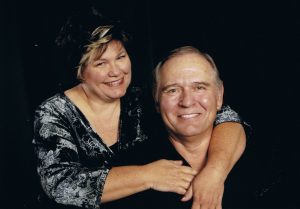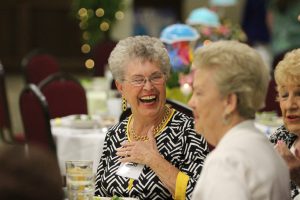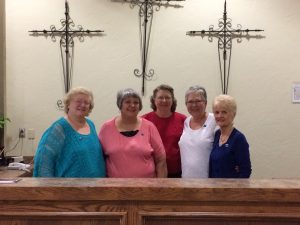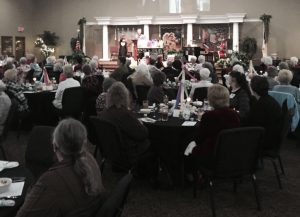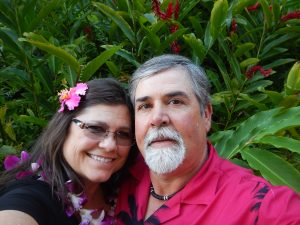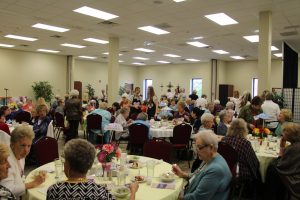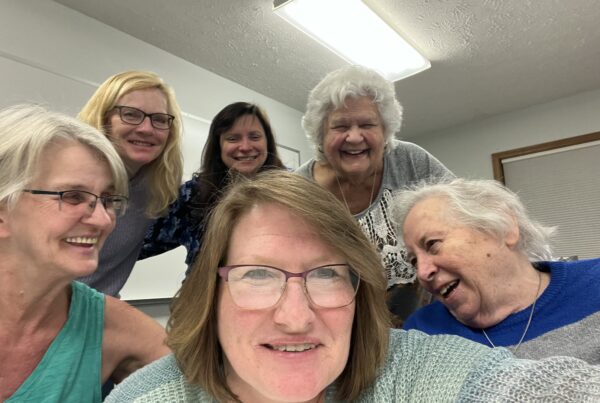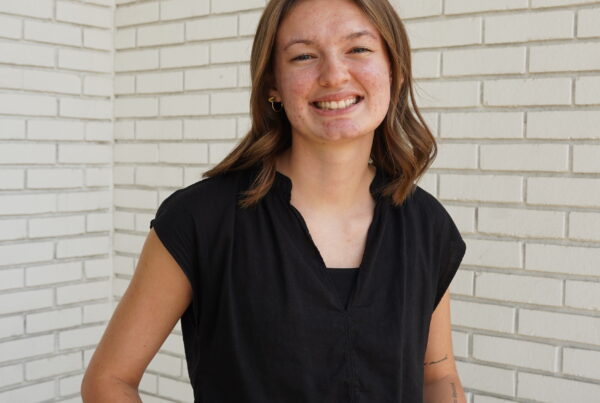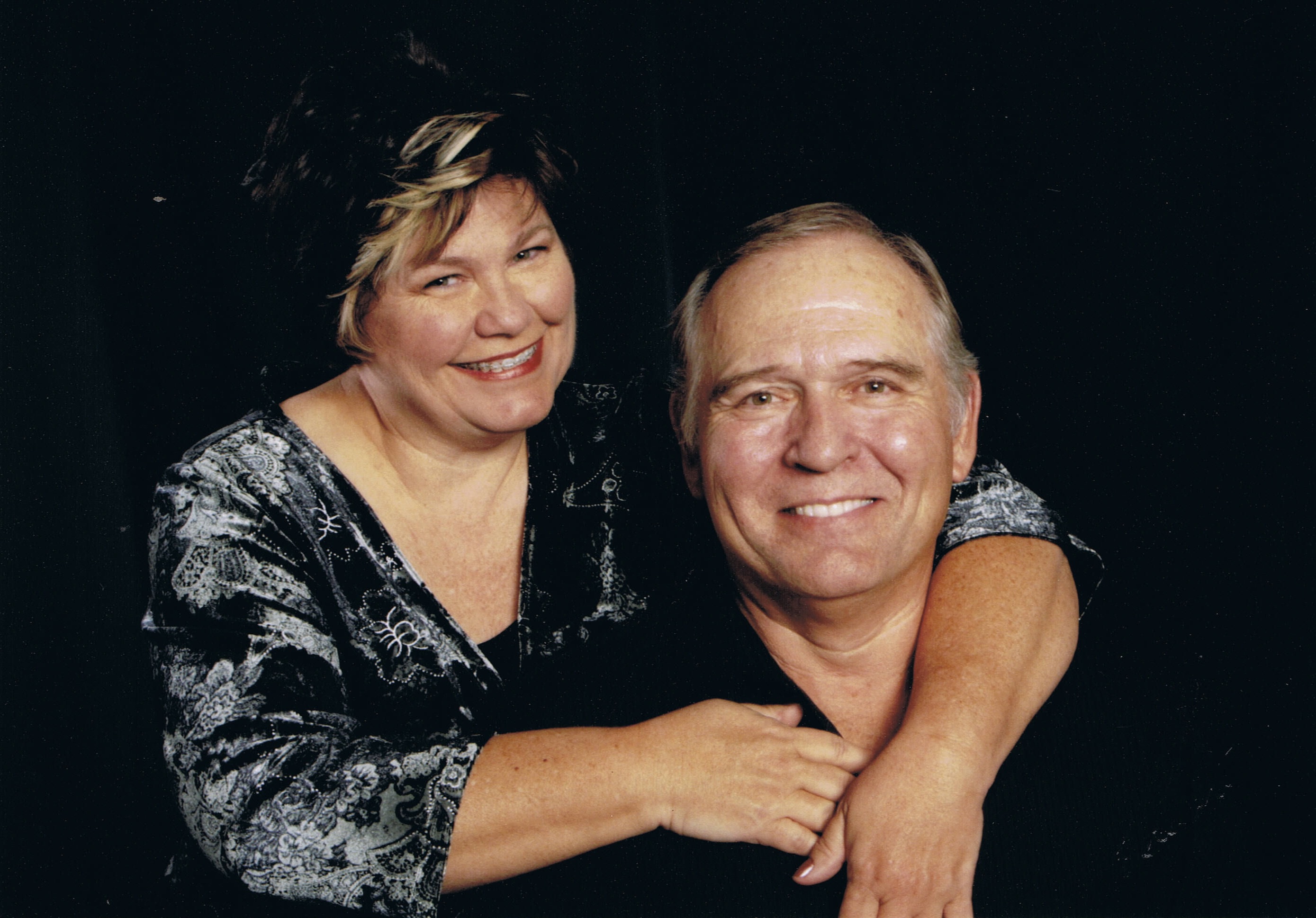
- Debbie and her first husband, Bobby Wall.
- Twelve churches, representing seven denominations, have partnered to host monthly dinners for widows in Pontotoc County. Participating churches include: Cross Cut Cowboy Church, First United Methodist, Asbury United Methodist, First Baptist, Union Valley Baptist, The Refuge Four Square Church, Crosspointe Church of Ada, Morris Memorial Baptist, St. Joseph Catholic, and more.
- Debbie Wall Ross recruited volunteers to help organize monthly dinners for widows. Judy Quaid, Barbara Walters, Betty Binkley, Sherry Gardner, Pat Herrin (left to right), and Susan Ayers (not pictured) round out her leadership team.
- The dinner events are focused on the meal and social time, but many evenings also feature entertainment including music, ballet, and line dancing.
- Debbie with her second husband, Dean Ross.
- Over 200 widows have attended dinner at a church in Pontotoc County.
On the Hillside
In 2010, Debbie Wall Ross stood on an isolated hillside in her nightgown for two hours. She was cold. But her anger was beginning to boil over. In the solitary company of her husband’s ashes, Debbie had a conversation with her Creator.
“You took the wrong person,” she lamented. “I want you to strike me right now. I don’t want to live anymore.” Debbie describes her time on the hill as “wailing.” It continued until she felt a response come across her thoughts, “God said, ‘Bobby’s life was complete,’” she remembers, years later, with tears in her throat, “’but yours’ is not complete.’”
A Love Story
Debbie met Bobby Wall when she was 14-years-old. The couple started dating and “never broke up.” They were married when Debbie turned eighteen. “It was a true love story,” Debbie says.
While raising their children, the Walls lived all over the country, “from California to Virginia.” When health issues forced Bobby to retire, the couple moved to a ranch near Ada, Oklahoma. In that isolation, Bobby and Debbie became even closer. They were together practically 24 hours a day. “We were best friends,” Debbie says. “In fact,” she pauses to consider her words, “probably we were each others’ only friends.”
Debbie enrolled in nursing school at age 45 so she would be able to take care of Bobby in his declining health. “I was going to rescue him if anything happened,” she says of her decision. “But God made it where there was no rescue to be had.” After the couple’s 40th wedding anniversary, Bobby passed away.
To Comfort All Who Mourn
Although her family was extremely supportive, Debbie says, “after about three months, people get back to their lives.” Debbie had searched for a support group in Ada to help her handle the grief, but couldn’t find a fit. She described herself as “broken.”
It was “brokenness” that led Debbie to the hillside that night. Her encounter with God did not immediately yield to any shift in perspective or lessening of grief. In fact, she says her initial thought was “What do I have to do to go home?”
Debbie went to Houston to stay with her daughter. There, she attended thirteen weeks of Grief Share sessions through her daughter’s church. At the end, she could acknowledge that maybe there would be a “light at the end of the tunnel” of her mourning. “It was still a tunnel,” she says, “but I could see that maybe God had a job for me.”
Returning to Ada, Debbie began facilitating Grief Share at her church, First Baptist Church of Ada, eleven months after Bobby’s death.
Through Grief Share, Debbie met other widows who could empathize with her feelings of brokenness, anger, and loneliness. “Widows need each other,” she said. “We would go out to eat together at least three times a week. We’d get through with our meal in ten minutes and talk for two hours.”
Debbie became her church’s representative to widows. “I made it my job in life,” she says. “I took calls at two o’clock in the morning, it didn’t matter. When you get ambushed by grief, you just need somebody to get you through that minute or fifteen minutes.”
In spite of all she was doing for widows at her church, Debbie “could see the need for more.” A pastor in her church, Harold Ware, invited Stand in the Gap for Widows Program Manager, Buddy Stone, to introduce the ministry to First Baptist in Ada. Debbie was inspired.
Dinner for Two-Hundred
Based on Stand in the Gap for Widow’s research and experiences working with other churches, Buddy suggested that widows need social interaction with other widows. Debbie was also inspired by another Stand in the Gap ministry partner in Duncan, Oklahoma, called Beautiful Day. Beautiful Day volunteers began hosting monthly dinners for widows in 2015.
Debbie wanted to host similar dinners in Ada. Her vision was to partner with other churches to make these social events as large, as regular, and as welcoming as possible. She formed a team of volunteers and began presenting the idea to local churches of all denominations based on her own experiences as a widow in the community.
In January 2016, the inter-denominational group hosted their first monthly dinner for widows in the community. Eighty-two widows attended. At the time of this writing, more than 200 widows in Pontotoc County have attended at least one dinner.
Each month, a different church hosts the event by providing the food, the facility, and door prizes. Twelve churches, representing seven denominations, have agreed to participate each year. Participating churches include: Cross Cut Cowboy Church, First United Methodist, Asbury United Methodist, First Baptist, Union Valley Baptist, The Refuge Four Square Church, Crosspointe Church, Morris Memorial Baptist, St. Joseph Catholic, and more. Debbie has seen her community “come together with Stand in the Gap to provide a structure to help the widows.”
The dinners are primarily social events. The goal is “to create an atmosphere where [widows] can talk to each other and feel special.” As a result, Debbie has seen guests move from isolated grief to being ready to “reach out to their community” by initiating service projects or canned food drives.
From Pain to Purpose
Outside of her kitchen window, a tree died in Debbie’s yard. She had it trimmed down to about ten feet and hired a wood carver to sculpt the word “purpose” vertically out of the trunk. Now, looking out of her window, she is reminded of one word, her night on the hillside, and the assurance God gave her.
In the six years since Bobby’s passing, Debbie married Dean Ross. She says that Dean “understands that this is my passion, this is my purpose in life.” The couple is building a home closer to Ada. She calls herself “extremely blessed and extremely happy.” Her cell phone “is lit up all the time” with widows expressing their appreciation for the monthly dinners and camaraderie they’ve found there.
Debbie is relishing the purpose that God placed in front of her and the relationships that her purpose brought to her life. “Out of this horrible circumstance of grief,” she says, “God has brought so much good.”
RESPOND NOW!
Are you called to be the “Debbie” for widows in your community?
In 2016, Stand in the Gap will serve more than 2,000 widows. Volunteers are needed to engage with local churches and host social activities for widows throughout the state of Oklahoma.
Email social@sitgm.org for more information.
